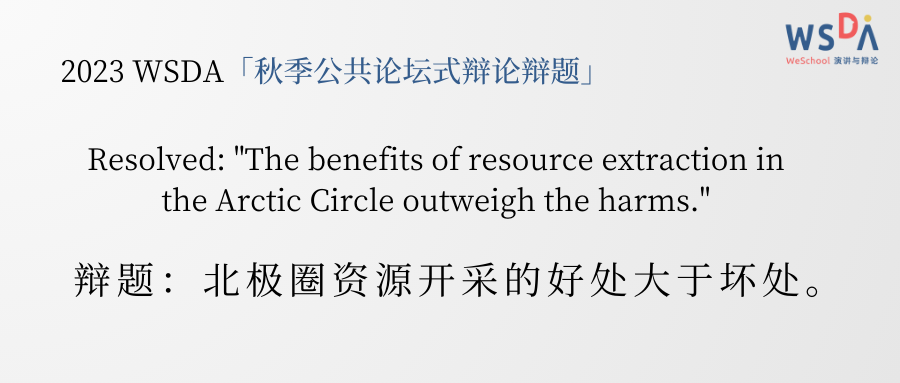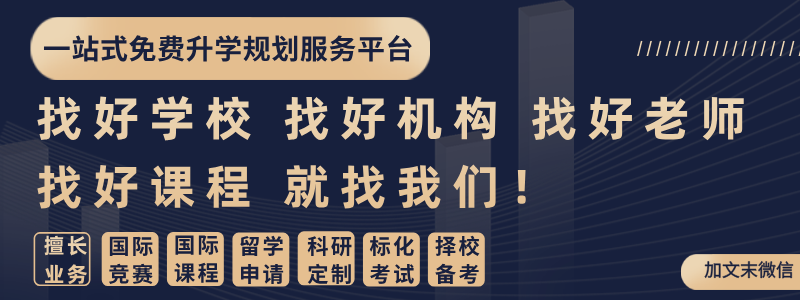WSDA秋季区域联赛辩题公布
全国总决赛结束了,秋季赛就不远啦。
透过一道道辩题,我们渴望WSDA的选手们能够通过这些辩题拓展视野,深入了解更加广阔的外部世界。
通过对这些辩题的辩论,他们将能够探索不同领域的观点和见解,培养全球化的思维,增进对全球事务、文化多样性和社会议题的认知。
这样的体验将有助于培养他们成为更具洞察力和包容性的领袖,为未来的挑战做好充分准备。
今天老师携着秋季赛辩题跟大家拜个早年。秋季区域赛辩题至此闪亮登场。大家可以速速开始动身准备起来啦!
BTW,秋季赛的赛程也将在8月底发布哦~
2023-2024 秋季区域联赛辩题
Resolved: "The benefits of resource extraction in the Arctic Circle outweigh the harms."
北极圈资源开采的好处大于坏处。
今年秋季赛,通过WSDA会员们的投票,我们决定将公共论坛式辩论辩题锁定在北极圈资源开采上,期望选手们能够就此展开激烈而深刻的讨论。
北极圈作为地球上最后的前沿地区之一,拥有丰富的自然资源,然而,其开发与保护之间存在着严峻的抉择。
选手们将有机会从不同角度探讨这一问题,包括环境影响、科技发展、经济利益等方面。通过深入研究和透彻思考,他们将能够展示出对于可持续发展、国际合作以及生态平衡的理解,从而培养出更为全面和深入的分析能力。

以下是WSDA学术总监 Cale Halley
对秋季赛辩题的简要介绍:
Resource extraction within the Arctic Circle has a long history shaped by various factors such as technological advancements, economic interests, and environmental concerns. The Arctic region is known for its abundance of natural resources, including oil, gas, minerals, and fish, making it an attractive area for extraction activities.
Arctic exploration began in the 19th century with attempts to find a Northwest Passage for trade. Expeditions by explorers like Roald Amundsen and Robert Peary helped uncover the region's potential resources.
The Cold War era saw increased interest in the Arctic due to its strategic importance. The United Nations Convention on the Law of the Sea (UNCLOS) in 1982 established a legal framework for resource exploitation in the Arctic, granting coastal states extended continental shelves.
Advances in technology, such as ice-breaking ships and drilling techniques, have made resource extraction more feasible in the challenging Arctic environment.
Some possible PRO arguments for resource extraction in the Arctic Circle include but are not limited to:
Economic Benefits: Extracting Arctic resources can boost economic growth, create jobs, and generate revenue for both the local communities and the countries involved.
Energy Security: The Arctic is estimated to hold significant oil and gas reserves, which can enhance energy security for countries heavily dependent on imports.
Technological Advances: The development of new technologies has made resource extraction safer and more efficient, reducing the environmental risks associated with extraction activities.
Infrastructure Development: Resource extraction projects require significant infrastructure development, such as roads, ports, and communication networks, which can improve connectivity and economic development in the region.
Indigenous Engagement: Involving indigenous communities in resource extraction projects can provide opportunities for economic development and capacity building.
Global Demand: Increasing global demand for resources, particularly oil and minerals, drives the need for exploration and extraction in untapped regions like the Arctic.
Some possible CON arguments for resource extraction in the Arctic Circle include but are not limited to:
Environmental Concerns: Resource extraction in the Arctic can have detrimental impacts on fragile ecosystems, including damage to wildlife habitats, pollution, and the release of greenhouse gases.
Climate Change: The Arctic is experiencing rapid warming, and resource extraction can contribute to climate change through increased carbon emissions and the release of methane trapped in permafrost.
Indigenous Rights: Resource extraction can threaten the traditional way of life and cultural heritage of indigenous communities who rely on the Arctic environment.
Safety Risks: The harsh and remote Arctic environment poses significant challenges to resource extraction operations, including the risk of accidents, spills, and response difficulties.
Unproven Technologies: Some argue that the technologies used for resource extraction in the Arctic are not yet proven to be environmentally safe, raising concerns about potential disasters.
Global Overreliance on Fossil Fuels: Critics argue that investing in Arctic oil and gas extraction contradicts efforts to transition to cleaner and renewable energy sources, perpetuating dependence on fossil fuels.
These arguments reflect the complex and multifaceted nature of resource extraction within the Arctic Circle, with proponents emphasizing economic benefits and energy security, while opponents highlight environmental concerns and the need for sustainable development.













